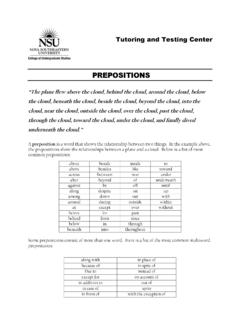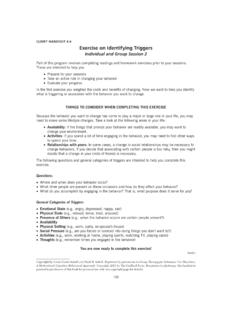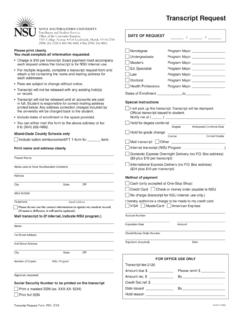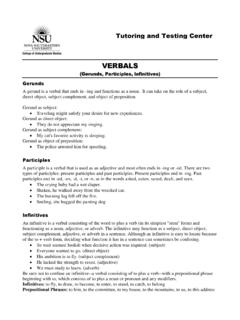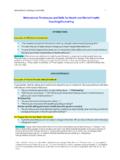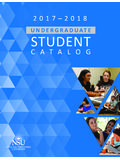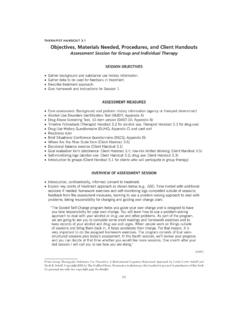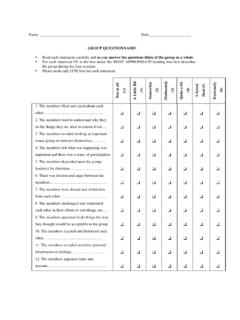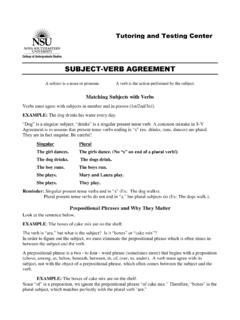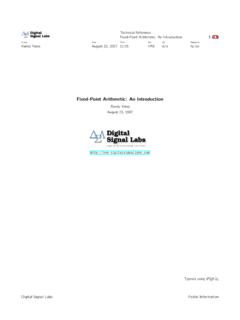Transcription of Tutoring and Testing Center - Nova Southeastern University
1 Tutoring and Testing Center MATHEMATICS. STUDY SKILLS GUIDE. Strategies for Success in Mathematics Page 2. Learning mathematics is different than learning most other subjects. In mathematics, special vocabulary and symbols are used and it is important that you not only understand the concepts being presented, but that you also apply these concepts. To be successful in mathematics, you need not only to read, attend class, and study, but you must practice the skills as often as you can. Mathematics is not a subject you learn by watching; you must DO mathematics to LEARN mathematics. The purpose of this STUDY. SKILLS GUIDE. is to present you with strategies for studying that have been effective for students in mathematics classes.
2 Developing good study habits is one of the keys to being a successful learner of mathematics. Nine strategies are described in this guide. The more strategies you are able to use, the more effective you will be in learning mathematics. Page 3. The nine strategies included in this guide are: 1. Make a study schedule 2. Maintain a mathematics notebook 3. Read your textbook prior to class 4. Do textbook examples 5. Write the mathematical procedures 6. Re-visit previously-studied concepts 7. Summarize concepts and procedures 8. Re-read prior to a quiz or test 9. Do quiz and test corrections Of course, attending class- -and paying close attention and taking good notes in class--is also very important.
3 Combining your classroom learning and your own studying, you can be a successful learner of mathematics. Page 4. 1. Make a Study Schedule Make a weekly schedule that includes work time, class time, other obligations, and family and recreational time. Then, mark off STUDY TIME. Make studying a regular activity in your life. A blank time schedule is included on the Center pages of this guide. Fill out this schedule and keep it with you. If you would like, make a copy of the blank schedule provided on page 7. Fill out a new schedule each semester or whenever there is a major change in your personal obligations. For many people, the weekends provide larger amounts of time for studying than do the weekdays.
4 In mathematics, however, studying only on weekends is not usually effective. It is important to study math EVERY DAY, even if it is for only 30 minutes or an hour. If you must do most of your studying on one or two days of the week, break up your study periods. Study one subject for an hour, then take a break. Do some other activity for 10 to 15 minutes, then resume studying. Give a fair amount of time to all your subjects, so that none suffer from lack of studying. Think carefully about your time. Do you have a few minutes on a work break during which you can Page 5. review some of your math? Can you read and study while you eat? If you look carefully, you might find some "hidden pockets" of time that you can use to sneak in some extra studying.
5 Students' comments about study time I would study early in the morning, when my mind was fresh.. The one strategy that has helped me the most is studying right after every class session. Go over the subject as soon as you get home. Page 6. Day/Time Sun Mon Tues Wed Thurs Fri Sat 7:30-8:00. 8:00-8:30. 8:30-9:00. 9:00-9:30. 9:30-10:00. 10:00-10:30. 10:30-11:00. 11:00-11:30. 11:30-12:00. 12:00-12:30. 12:30-1:00. 1:00-1:30. 1:30-2:00. 2:00-2:30. 2:30-3:00. 3:00-3:30. 3:30-4:00. 4:00-4:30. 4:30-5:00. 5:00-5:30. 5:30-6:00. 6:00-6:30. 6:30-7:00. 7:00-7:30. 7:30-8:00. 8:00-8:30. 8:30-9:00. 9:00-9:30. 9:30-10:00. 10:00-10:30. 10:30-11:00. 11:00-11:30. 11:30-12:00. 12:00-12:30. Page 7.
6 Students' advice for being successful I found that doing the homework day-by-day (a little every night) really helped me. Make sure you do all the homework. The flash cards were helpful. Going over and over homework as well as notes. With no homework a student won't survive. Keep up. If falling behind, get help. Don't miss any classes. Attendance is critical. I. struggled the week or two that I missed a class. Page 8. 3. Read Prior to Class Understanding the vocabulary and symbols used in mathematics is a big part of learning to do mathematics. Before class (perhaps the day before), read the parts of the textbook that will be discussed in class. Pay special attention to new vocabulary terms and symbols.
7 Highlight or take notes on these. Also look carefully at items that are in boxes or in bold type. Read over the examples too. The purpose of doing this is to get a head start on learning this new material. By studying the vocabulary beforehand, you may better understand what your instructor is saying in class. The words and symbols will not be completely foreign to you, so you will be able to concentrate more on the concepts and skills. At times, your instructor may tell you NOT to read some portion of the textbook. The reason for this is that he or she probably thinks the textbook will hinder and not help your understanding of the material. In these cases, follow your instructor's directions.
8 Page 9. A note about mathematics vocabulary Some words used in mathematics are not used outside of the subject. But many mathematical terms are used elsewhere in everyday language. Distinguishing different meanings of a word--and its special meaning in mathematics--is an important part of learning to do mathematics. Examples: Power" refers to an exponent in mathematics, but has many other meanings, such as in electrical power, in other settings. Difference is a mathematical term that indicates the result of the operation of subtraction. In everyday usage, difference refers to how two or more things are not alike. Page 10. 4. Do Textbook Examples Each example in the textbook is usually accompanied by a step-by-step procedure for completing it.
9 This is a good source of feedback for you. When you begin your studying, you should re-read the sections of the textbook that were covered in class and work out each example . Cover the solution to the example , then work it out. You can refer to your notes, but do not look at the solution. Check your solution with the textbook after you think you have completed it correctly. If you do not do it correctly, read the text once more and review your notes to try to understand why you did not get it correct. There are two ways you can use this strategy: 1) Read and do all the examples in the section before doing the homework exercises at the end of the section or 2) Read and do the examples on one concept, then do some of the homework exercises on that concept, and go back and forth between reading/.
10 Doing examples in the homework exercises. Page 11. As in the previous study strategy, your instructor may ask that you NOT use your textbook as a study aid. In these cases, you will need to rely on your notes as you do the homework exercises. Be sure, in any case, that you are taking thorough notes in class. A note about doing homework Do not just do the exercises at the beginning of the problem set. Usually, the exercises get harder as you move on. It is best to do some of each--from simpler to harder--at first, then go back and do the ones you skipped. Make notes to yourself as you do your homework, especially on concepts that are not com- pletely clear to you. You can ask about these prob- lems during your next class meeting.
